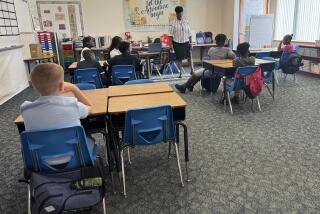Disney Name Loses Some of Its Magic
If you’re able to listen in, Walt, the folks at Walt Disney Elementary School in Burbank want you to know one thing.
You shouldn’t take it personally. They don’t mean to dis’ Walt Disney. Not you and not your legacy, either.
They know it’s been a rough year for you. But it’s not like they believe everything in “Walt Disney: Hollywood’s Dark Prince,” the biography-cum-hatchet job that came out this summer. They have a hard time seeing you--the creator of Mickey Mouse and the empire he symbolizes--as a high-handed, hard-drinking, anti-Semitic jerk who served as an FBI snitch.
Your family says that book is “hogwash” and that’s good enough for the Burbank Unified School District. Rest assured, that isn’t why they’re thinking about giving Walt Disney Elementary a new name.
It seems pretty sad. When this little school in Burbank changed its name in 1969, just a couple years after your death, it seemed such an apt tribute. Kids love Mickey and Co., so it seemed pretty neat to go to a school called Disney instead of Central.
“We’ve been very proud to be Walt Disney Elementary School,” says D. Dee Dent, the PTA vice president. “Who wouldn’t want to go to a school named after a man who the kids loved and gave us so many hours of entertainment?”
Yet now they want a new name, though they’re not sure what.
The reason is money.
You see, Walt, you were just too successful. You had the golden touch. As Disney Elementary Principal Linda E. Reksten and PTA President Jean Lusby explain it, whenever somebody hears “Walt Disney Elementary” for the first time, they just naturally assume it’s a school for rich kids. Perhaps a private school.
“There’s not a phone call I make,” Reksten says, “that somebody doesn’t say, ‘Do you have movie stars that go to the school?’ Or, ‘Are you located on the studio lot?’ ”
But it isn’t true.
Hardly a school for rich kids, Disney Elementary is a public school that serves 358 students, most of whom are the opposite of affluent. About two-thirds of the pupils come from families who receive Aid to Families with Dependent Children, Reksten says. Most are provided a free or a subsidized lunch. The school is proud of its computer education program, but not happy about its peeling paint and ancient library books.
Now, Reksten and Lusby say, the second thing people assume when they hear your name is that, at the very least, Disney Elementary benefits from the philanthropy of your corporate or familial heirs. Even in Burbank, they say, it’s a common perception.
But Walt, that’s not true either.
Although the Walt Disney Co. helps two other schools in the Burbank district, it has no special relationship with Disney Elementary. If anything, the relationship between Disney Elementary and the Disney Co. has caused some bruised feelings.
The problem concerns the use of copyrighted images that you created. To foster school spirit, Lusby says, the PTA buys Mickey Mouse T-shirts from Disney and sells them to the students at cost. But at $8 or $9, it’s a luxury that many of the school’s families can’t afford. And just two weeks ago, some school staff members were unhappy when district Supt. Art Pierce, concerned about copyrights, instructed the school to stop using a letterhead that depicted a group of children in mouse ears.
But the letterhead and pricey T-shirts have absolutely nothing to do with the desire to change names, the folks at Disney Elementary say. They have no interest in bashing Disney.
They just need money.
Like many schools today, Disney Elementary is the kind where the kids and parents sell wrapping paper and candy bars to purchase basic supplies. It’s a needy school that would benefit greatly from grants or adoption by a well-heeled corporate citizen. It would seem to be a prime candidate.
But Disney Elementary keeps getting turned down. Reksten and the parents figure it has everything to do with the school’s affluent image. Maybe foundations figure that anything called Disney shouldn’t have to go begging. Companies probably think the same way. Besides, companies want partnerships that promote their public image. Why help a school called Disney when you can adopt one named for a dead president?
You’ve been gone awhile, Walt, so you may have a question. You may not understand why public schools have to hustle for scarce private donations.
Remember what California’s schools were like? They were among the nation’s best, right? As syndicated columnist Richard Reeves recently pointed out, California used to routinely rank in the top five for funding and student achievement. But in the 15 years since Proposition 13, California has slipped steadily down into the bottom 10. California’s fourth-graders recently tied for last, with Mississippi, in a standardized reading test.
Walt, whether you’re in heaven, hell or limbo, you’ve no doubt heard of Proposition 13. That was the initiative that lowered property taxes and established a two-thirds electoral standard for any property tax increases. Proposition 13 passed with 65% of the 1978 vote and was called a landslide. Today, a property tax measure that receives 65% is called a loser. Doesn’t that seem, well, Goofy?
This is why California’s per capita spending for public school students last year was roughly $4,600, over $1,000 below the national average.
And it’s why schools sell wrapping paper and candy bars. It’s why they fight each other for private money. It’s why they battle new initiatives that may do further damage to a system that, not so long ago, worked pretty well.
And that’s why if a school is named Walt Disney, it tries to change its name.
Sorry about that, Walt.
More to Read
Sign up for Essential California
The most important California stories and recommendations in your inbox every morning.
You may occasionally receive promotional content from the Los Angeles Times.










